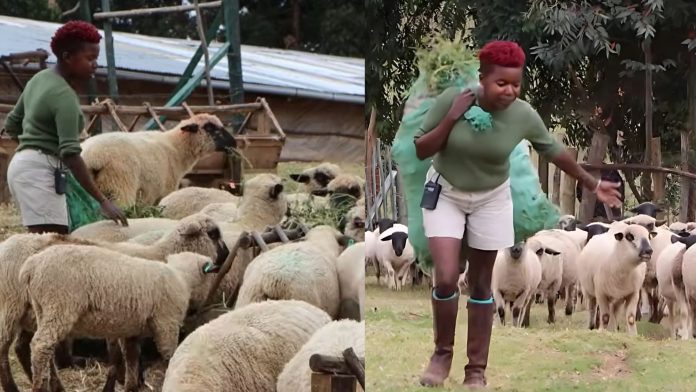Penzi Farm in Nakuru County is home to a young Kenyan lady who has successfully built a sheep farming enterprise from the ground up. She started the farm 4 years ago in 2021, having humble beginnings to now becoming a thriving registered breeding farm.
She keeps Hampshire Down and Dorper varieties at her farm, choosing the two varieties of sheep for their superior genetics, good weight, excellent meat quality and thus great returns in the shortest period of time.
The main factors behind her success is the keen eye management of feeding, breeding and animal hygiene. She feeds her sheep on Lucerne fodder diet which is rich in protein content, in addition to the grass they graze on and other supplements.
She has divided her land into different grazing paddocks, allowing her to separate the weaner rams from the more mature ram. This setup minimizes the competition for food.
To improve the quality fo her flock, she invested in high-quality breeding stock. The young lady imported a T5 Dorper Ram and two other Hampshire Dorper Rams from South Africa for breeding purposes.
Her farm has produced Dorper and F3 Hampshire Down offspring. Her goal is to improve her flock to get F4 rams.
The sheep at Penzi Farm are reared on a semi-zero grazing system, giving her the room to do paddock rotation and controlled breeding. She has separated pens for breeding rams, weaners and the ewes.
The young woman insisted that it is important to have controlled breeding as it helps with feeding calculations as well as close monitoring of the animals. The rams are only allowed near the ewes during the mating season.
Hygiene is also a top priority at the farm. She ensures that the water the animals drink is clean and poured into plastic troughs, which prevents rust contamination. Furthermore, the compound is kept clean and free from nails and any litter.
Such an environment not only keeps them free from diseases but contributes to their overall well-being which is crucial for optimal production.
She excitedly describes the female sheep as the farm’s bank. She advised aspiring sheep farmers to first identify the type of breed they wish to keep, conduct thorough research and visit established farms to understand the practice.
“For example, when going for a male dorper, you should know that you are going for masculinity. When going for a female, you’re after femininity. Other things considered include the colouring, the muscle, length and depth,” she stated.
She further clarified that a pure Dorper T5 ram should not have any black spots on its body except on the neck and head.
“If it has a white spot on the head then it doesn’t qualify to be a T5. Farmers should know that they can purchase a T5 and it is not guaranteed that the offspring will be a T5,” the young lady continued.
She only sells rams that have attained at least 8 months of age. A spot check by Bizna Kenya shows that the auction start price for the F3 Hampshire Down weaner rams starts at Sh. 45,000 and can go as high as for a mature F3 ram Sh. 155,000.
I quit lucrative US Wall Street job for Dorper sheep farming in rural Kenya
For a premium quality 10-month-old Dorper ram bred from South African parent stock, one can get it available on sale at Sh. 100,000. In South Africa, they sell for as high as Sh. 250,000. She urged sheep farmers to think strategically about their investments.
“If you are purchasing a Sh. 200,000 ram and you only have 10 ewes, you’re conducting poor mathematics…at the end of the day, it’s kilimo biashara. Apart from feeding, there is the man management part,” she said.
The young lady asserted that a mature ram, for optimal business use, should have at least 50 females and a bare minimum of 25 females for mating.
Additionally, she spoke about land management. She stated that Dorpers are heavy feeders. For this reason, one acre should accommodate at least 15 heads. On the other hand, the Hampshire Downs can take 25 heads per acre of land.







